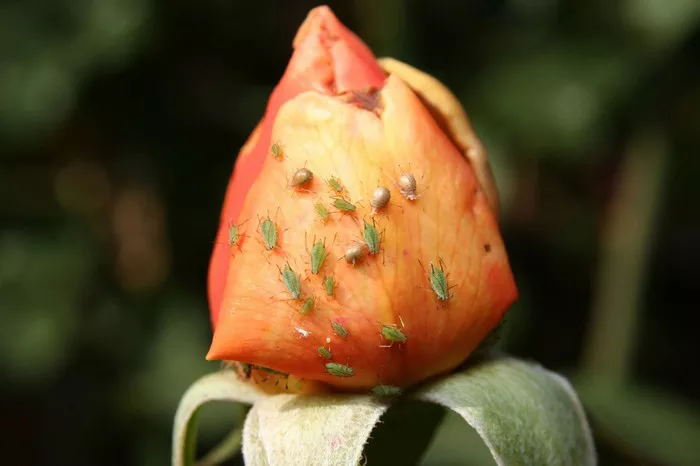Rose slugs, more commonly known as aphids, are a persistent nuisance for rose gardeners worldwide. These tiny, sap-sucking insects can wreak havoc on rose plants, causing stunted growth, distorted leaves, and even transmitting harmful plant viruses. Fortunately, there are several organic, natural, and chemical control methods available to manage aphid infestations and protect your prized roses. In this comprehensive guide, we will explore various strategies to identify, control, and prevent aphids on roses.
Identifying Aphids on Roses
Aphids are small, soft-bodied insects typically found clustered on the undersides of leaves or along tender new growth. They come in various colors, including green, black, yellow, or red, depending on the species. These pests reproduce rapidly, giving birth to live young without the need for mating, making it easy for populations to explode under favorable conditions.
The lifecycle of aphids includes four stages: egg, nymph, adult, and winged adult. Nymphs resemble smaller versions of the adult aphids but may lack wings. Adult aphids can reproduce asexually, allowing populations to grow rapidly within a short period.
Signs of aphid infestation on rose plants include distorted or curled leaves, yellowing foliage, sticky honeydew secretions on leaves and stems, and the development of sooty mold fungus on honeydew-coated surfaces. Additionally, the presence of ants crawling on rose plants may indicate an aphid infestation, as ants are attracted to the sweet honeydew produced by aphids.
Various types of aphids may infest roses, including the green peach aphid, rose aphid, and black bean aphid. While they may differ slightly in appearance and preferred host plants, their feeding habits and damage symptoms are generally similar across species.
Damage Caused by Aphids
Aphids feed on the sap of rose plants by piercing the plant tissue with their needle-like mouthparts. This continuous feeding weakens the plant, leading to stunted growth, wilting, and reduced flower production. Additionally, aphids excrete honeydew, a sugary substance that serves as a substrate for the growth of sooty mold fungus. Sooty mold can coat leaves, stems, and flowers, interfering with photosynthesis and further stressing the plant.
One of the most significant concerns associated with aphids is their ability to transmit plant viruses. As aphids feed on infected plants, they can acquire viruses and transmit them to healthy roses as they move from plant to plant. Viral diseases such as rose mosaic virus and rose rosette disease can cause severe damage and even death to infected roses, making aphid control crucial for maintaining plant health.
Organic/Natural Control Methods
1. Water Sprays: One of the simplest and most effective methods for controlling aphids on roses is using strong blasts of water to dislodge and remove them from plants. Regularly spraying affected plants with a hose can help reduce aphid populations, especially in the early stages of infestation.
2. Insecticidal Soap: Insecticidal soap is a safe and environmentally friendly option for controlling aphids on roses. Made from natural ingredients such as potassium salts of fatty acids, insecticidal soap disrupts the cell membranes of aphids, ultimately leading to their demise. To use, thoroughly spray affected plants, ensuring coverage of both upper and lower leaf surfaces. Repeat applications may be necessary for severe infestations.
3. Neem Oil: Derived from the seeds of the neem tree, neem oil acts as a potent repellent and disruptor of aphid life cycles. Neem oil contains compounds that interfere with aphid feeding and reproduction, ultimately reducing populations over time. Dilute neem oil according to package instructions and apply as a foliar spray to affected plants. Reapply every one to two weeks, especially after rainfall or irrigation.
4. Beneficial Insects: Introducing natural predators such as ladybugs, lacewings, and parasitic wasps can help control aphid populations in the garden. These beneficial insects prey on aphids, keeping their numbers in check without the need for chemical intervention. Consider purchasing and releasing beneficial insects into your garden to establish a balanced ecosystem and naturally suppress aphid infestations.
Chemical Control Methods
While organic and natural methods are preferred for aphid control, chemical insecticides may be necessary for severe infestations that cannot be effectively managed by other means. When using chemical control methods, it is essential to choose products that are selective, low-toxicity, and labeled for use on roses. Always follow the manufacturer’s instructions and take appropriate safety precautions, such as wearing protective clothing and avoiding application during windy conditions or when bees are active.
Some recommended chemical insecticides for aphid control on roses include pyrethrin-based products, insecticidal soaps with added pyrethrins, and systemic insecticides containing imidacloprid or dinotefuran. These products provide quick knockdown of aphid populations and residual protection against future infestations when applied according to label directions.
Preventative Measures
Preventing aphid infestations in the first place is the most effective strategy for protecting your roses. Here are some preventative measures to consider:
1. Avoid Excessive Nitrogen Fertilization: Aphids are attracted to succulent new growth stimulated by high nitrogen levels. Avoid over-fertilizing roses with nitrogen-rich fertilizers, as this can promote tender growth favored by aphids. Instead, opt for balanced fertilizers or slow-release formulations to encourage healthy, resilient plants.
2. Maintain Plant Health: Keeping roses healthy and vigorous is essential for minimizing aphid infestations. Provide adequate water, sunlight, and nutrients to promote robust growth and resilience to pests and diseases. Regular pruning of dead or diseased foliage can also help improve air circulation and reduce aphid habitats.
3. Monitor for Early Detection: Regularly inspect rose plants for signs of aphid infestation, including curled leaves, sticky honeydew, and the presence of ants. Early detection allows for prompt intervention and prevents aphid populations from spiraling out of control. Consider using yellow sticky traps or handpicking aphids from plants as part of your monitoring routine.
Conclusion
In conclusion, managing aphids on roses requires a multi-faceted approach that integrates organic, natural, and chemical control methods, along with preventative measures to minimize future infestations. By identifying aphids early, implementing effective control strategies, and promoting a healthy garden environment, you can keep your roses thriving and free from the damage caused by these troublesome pests.


